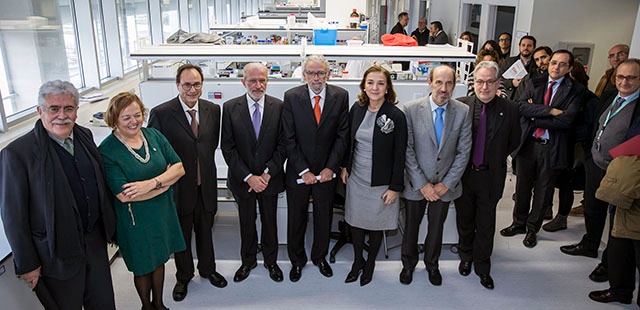This Tuesday, Esteban Morcillo, rector of the Universitat de València, and Rosa Menéndez, president of the CSIC, have inaugurated the Institute for Integrative Systems Biology. This is a new researching centre dedicated to the study of complex biological systems, mostly microorganisms, with applications in biomedicine and biotechnology mainly. They have been accompanied by Carmen Vela, secretary of the State Secretariat of Research, Development and Innovation; by Vicent Soler, the minister of Finance of the Valencian Regional Government (conseller d’Hisenda de la Generalitat Valenciana) and by José Luis García López, director of the I2SYSBIO.
“Integrative systems biology is an emergent and fundamental discipline for modern biology. It allows us to study the nature from a holistic perspective, different from the obsolete vision we used to work with some time ago. It easies the transfer of knowledge. That is why we are at the Parc Científic of the Universitat de València, surrounded by businesses and industries: we have a lot to provide to the production sector. However, in order to become truly competitive, we need help to consolidate these infrastructures and the workforce we currently have”, as José Luis García, director of the centre, has pointed out at the opening act of the Institute for Integrative Systems Biology, which took place this morning at the Parc Cientític of the Universitat.
Regarding this, the conseller Vicent Soler has referred to knowledge as the key factor with more capacity of boosting the economy from a sustainable perspective in all its areas. “Science must be supported and driven forward with more resources, which is why we need a regional financial system capable of providing solutions not only to urgent matters, but to the necessary ones”.
The current study of biological processes on living organisms, treated as complex systems, requires the collaboration of several theoretical and experimental disciplines that converge in the integrative systems biology. The advances in life systemic meet the search of solutions in the field of health or pharmaceutical industry and agri-food industries. It is a new area of scientific research, also denominated New Biology, and it nourishes from the knowledge of geneticists, biochemists, cellular biologists or computational biologists, among others.
The rector Esteban Morcillo has highlighted the importance of collaboration between institutions. “The inauguration of the I2SYSBIO is the outcome of the effort of the Universitat de València and the CSIC, which have been collaborating in order to take advantage of the knowledge generated by their researchers and also of the effectiveness of their technics and their administrative staff. Such a centre cannot prosper without collective work”, he stated. “The institute we are about to inaugurate it is not just a building, as researching activities are conducted inside it. The Nature Index already informs about the I2SYSBIO and there are activities with the signature of this centre, thanks to those who work here and lead the institutions to international recognition.
For her part, Rosa Menéndez has shown satisfaction for having witnessed the birth of this mixed centre of research just a few months after assuming the charge as president of the CSIC. “The Universitat de València is a welcomed partner by the CSIC. This foundational agreement for technological based businesses to install their research laboratories here is a significant beginning”, she claimed.
The I2SYSBIO, mixed centre of research of the Universitat de València and the CSIC, focuses its research on the structure, function, dynamics, evolution and handling of complex biologic systems, emphasising on the study of the microorganisms’ systems. Organised in five areas of action – interdisciplinary work environment in order to solve common problems, development of high-quality research, knowledge transferring, training of researchers and the impulse of Integrative Systems Biology in Spain. The institute is opened to the participation of businesses, as it is the case of the biotechnological BIOPOLIS, the first private entity signing a protocol of collaboration with the new Institute for Integrative Systems Biology.
“The talent and capacity of the scientists of this centre with innovative vocation make the transference a collaboration between science and businesses which will provide solutions to real problems in order to achieve a better society, more equal, more democratic” said Carmen Valera, the secretary of the State Secretariat, at the end of the event.
Co-ruled by the microbiologist José Luis García López (CSIC) and the biochemist Juli Peretó (UV), the institute covers five programs of biological research: Theoretical and Computational, Molecular Interaction Systems and Regulation, Pathogenic Systems, Symbionts Evolution and Applied Biological Systems and Synthetic Biology. It counts on 13 groups of research.
Placed on a recently constructed building at the Parc Científic of the Universitat de València, the I2SYSBIO starts with a workforce of 80 employees – researchers and supporting staff – and an excellent scientific grounding provided by researchers mostly coming from the Cavanilles Institute of Biodiversity and Evolutionary Biology, of the Universitat de València, and from the Institute for Plant Molecular and Cellular Biology, mixed centre CSIC-UPV.
The new building is structured in wide opened and shared spaces as co-working laboratories, inspired by the working philosophy of the most advanced researching centres, and designed to favour the collaboration between researches from different theoretical, experimental and computational areas in common projects.


